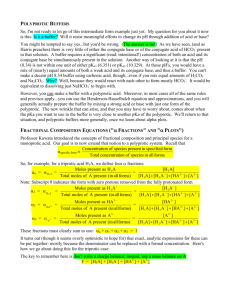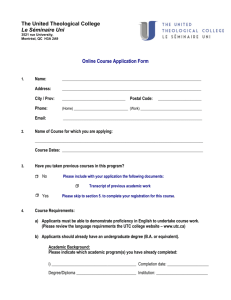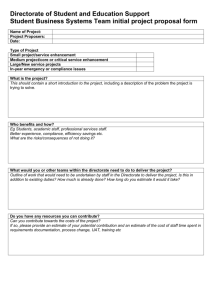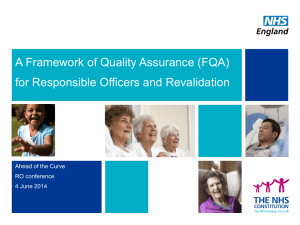9C Faculty Quality Audit: Policy and Procedure
advertisement
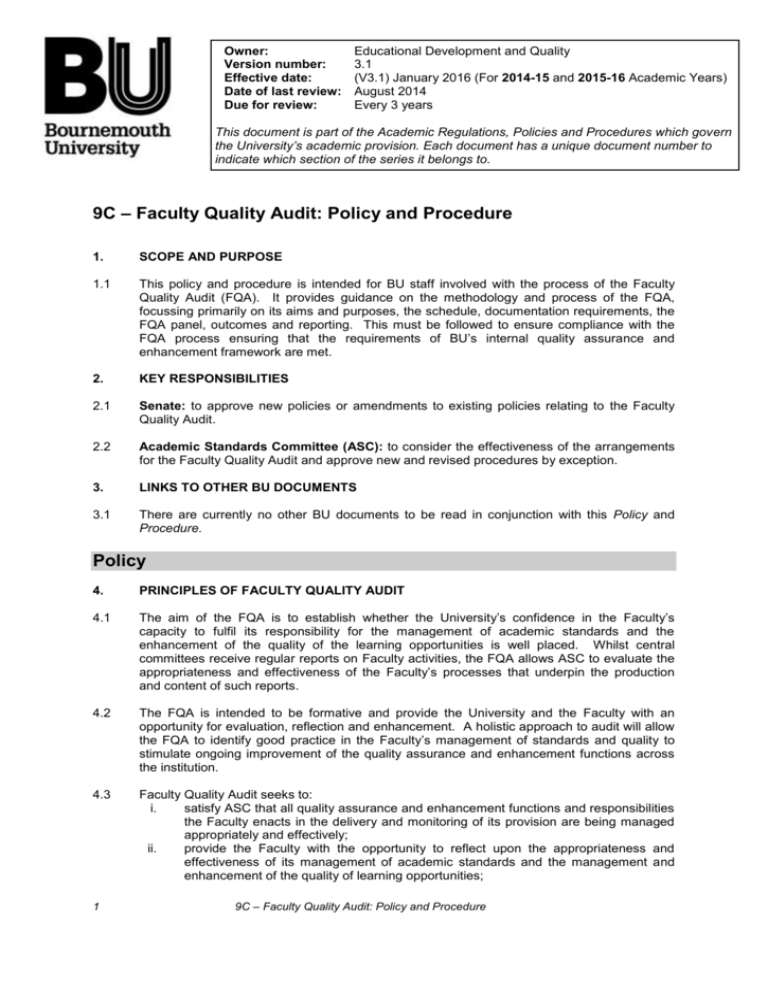
Owner: Version number: Effective date: Date of last review: Due for review: Educational Development and Quality 3.1 (V3.1) January 2016 (For 2014-15 and 2015-16 Academic Years) August 2014 Every 3 years This document is part of the Academic Regulations, Policies and Procedures which govern the University’s academic provision. Each document has a unique document number to indicate which section of the series it belongs to. 9C – Faculty Quality Audit: Policy and Procedure 1. SCOPE AND PURPOSE 1.1 This policy and procedure is intended for BU staff involved with the process of the Faculty Quality Audit (FQA). It provides guidance on the methodology and process of the FQA, focussing primarily on its aims and purposes, the schedule, documentation requirements, the FQA panel, outcomes and reporting. This must be followed to ensure compliance with the FQA process ensuring that the requirements of BU’s internal quality assurance and enhancement framework are met. 2. KEY RESPONSIBILITIES 2.1 Senate: to approve new policies or amendments to existing policies relating to the Faculty Quality Audit. 2.2 Academic Standards Committee (ASC): to consider the effectiveness of the arrangements for the Faculty Quality Audit and approve new and revised procedures by exception. 3. LINKS TO OTHER BU DOCUMENTS 3.1 There are currently no other BU documents to be read in conjunction with this Policy and Procedure. Policy 4. PRINCIPLES OF FACULTY QUALITY AUDIT 4.1 The aim of the FQA is to establish whether the University’s confidence in the Faculty’s capacity to fulfil its responsibility for the management of academic standards and the enhancement of the quality of the learning opportunities is well placed. Whilst central committees receive regular reports on Faculty activities, the FQA allows ASC to evaluate the appropriateness and effectiveness of the Faculty’s processes that underpin the production and content of such reports. 4.2 The FQA is intended to be formative and provide the University and the Faculty with an opportunity for evaluation, reflection and enhancement. A holistic approach to audit will allow the FQA to identify good practice in the Faculty’s management of standards and quality to stimulate ongoing improvement of the quality assurance and enhancement functions across the institution. 4.3 Faculty Quality Audit seeks to: i. satisfy ASC that all quality assurance and enhancement functions and responsibilities the Faculty enacts in the delivery and monitoring of its provision are being managed appropriately and effectively; ii. provide the Faculty with the opportunity to reflect upon the appropriateness and effectiveness of its management of academic standards and the management and enhancement of the quality of learning opportunities; 1 9C – Faculty Quality Audit: Policy and Procedure iii. iv. v. enable the University to identify and disseminate good practice in the management of quality assurance and enhancement; highlight any areas for improvement in current Faculty and University quality assurance and enhancement practices and identify necessary actions to better facilitate the processes and activities that underpin the quality assurance and enhancement framework at Faculty level; be as ‘light touch’ as possible in achieving the aims of the FQA. Procedure 5. PROCESS 5.1 Faculty Quality Audit Schedule 5.1.1 ASC will determine the schedule of audits. FQA is normally conducted on a quinquennial basis but may be scheduled to take place at any time if ASC deems this necessary. The date for the FQA will be agreed between the Faculty and Education Development and Quality (EDQ) at least 12 weeks prior to the FQA. An indicative FQA timetable is included in Appendix 1. 5.1.2 A preparatory meeting is held with Faculty representatives to identify the timescales and key representatives who will be involved in the preparation of documentation and collection of evidence. This may be followed by further meetings between the Faculty and selected panel members to monitor progress and to set key deadlines. A Quality and Enhancement Officer assigned to the FQA will be available to offer the Faculty support and advice throughout the process. 5.1.3 The FQA event is normally conducted within a day. The panel meets with student representatives, senior Faculty managers, and academic and administrative staff members. A proposed schedule of meetings is included in Appendix 2. The agenda for these meetings will be based on the key quality assurance activities within the Faculty and is informed by the FQA panel’s reading of the documentation provided for the audit. 5.1.4 Following the FQA event, the Faculty will receive initial feedback followed by a report (see Section 6). The Faculty is required to produce a response and an action plan to address any recommendations placed on the Faculty. EDQ will co-ordinate a response to any actions placed on the institution to submit alongside the Faculty response. FASC should take receipt of the final report and monitor progress on the Faculty Action Plan. ASC will maintain oversight of the Action Plan annually until all actions are deemed completed. 5.2 Documentation 5.2.1 Whilst satisfying ASC that the quality assurance and enhancement responsibilities assigned to Faculties are being managed effectively, the FQA is intended to impose the least burden possible upon Faculties. FQA adopts an evidence-based approach of self-evaluation and peer review consonant with common audit methodologies in the sector. Encouraging such evaluation by both the Faculty and the audit team promotes the collegiate nature of the approach and allows the Faculty to benefit from the process of reflecting on the management of standards and quality as evidenced by the supporting materials. Documentation should be targeted and proportionate and where possible consist of existing documentation produced for internal purposes or for external bodies. 5.2.2 The latest Faculty Quality Report (SQR/FQR) should act as the starting point for the Faculty in the preparation of a short Briefing Paper. The SQR/FQR informs ASC of the strengths and issues identified through the Faculty’s quality assurance arrangements and, to a large extent, reflect the work of the FASC. However this document is not intended to evaluate the effectiveness of these arrangements and may have been submitted some time before the FQA. The Faculty is therefore required to produce a Briefing Paper, which should be brief 2 9C – Faculty Quality Audit: Policy and Procedure (approx. 4-6 pages) and evaluate the appropriateness and effectiveness of the Faculty’s management of standards and quality. The Briefing Paper should identify areas the Faculty regards as effective and areas which require improvement. The Faculty commentary on effectiveness should be predominantly focused on the key areas raised in the latest SQR/FQR, provide updates where appropriate and direct the panel to the sources of evidence to illustrate areas identified. 5.2.3 Core audit documentation typically comprises the following1: i. ii. iii. iv. v. vi. vii. viii. ix. x. xi. xii. xiii. xiv. Briefing Paper produced by the Faculty; Faculty strategy documents (this may include documents such as the Faculty Delivery Plan and any strategic plan); Organisational diagrams (Faculty committee and management arrangements); Latest and previous Faculty Quality Report; Latest Education Enhancement Plan (or equivalent e.g. ESEP); Faculty Academic Standards Committee papers and minutes - (1 calendar year from the date of the FQA) – Minutes and agenda (Core) / Committee papers (Supplementary); Faculty Academic Board papers and minutes - 1 calendar year from the date of the FQA) – Minutes and agenda (Core) / Committee papers (Supplementary); Faculty Education and Student Experience Committee papers and minutes - (1 calendar year from the date of the FQA) – Minutes and agenda (Core) / Committee papers (Supplementary); Faculty Executive papers and minutes (1 calendar year from the date of the FQA) – Minutes and agenda (Core) / Committee papers (Supplementary); Faculty Research and Enterprise Committee papers and minutes - (1 calendar year from the date of the FQA) – Minutes and agenda (Core) / Committee papers (Supplementary); Latest Faculty Research Quality Report; A representative sample of full Annual Reports on Framework Monitoring (ARFMs) to cover the extent of the Faculty’s provision (e.g. UG, PG, partnership) and to include partner provision where applicable; Information on Faculty student feedback and engagement approaches and student focus group reports (or equivalent). Review of Faculty Assessment Practice (see Appendix 4 for further details)2 Other documentation may be added at the discretion of the Faculty or on request by the audit panel. If any committees are split or have sub-groups then equivalent evidence must be included. NB: Please refer to the allocated FQA EDQ representative for further guidance on the documentation requirements. 5.2.4 1 2 3 A Quality and Enhancement Officer will be able to offer advice on drafting a Briefing Paper, the collection of relevant documentation and necessary supporting evidence, the sample type and size, and the presentation of the evidence base. Faculties are encouraged to carefully consider how they can most helpfully evidence the effectiveness of their management of quality assurance and enhancement, e.g. through case studies, examples, or ‘paper trails’. The documentation and supporting evidence required by the FQA panel should be prepared in accordance with the indicative schedule outlined in Appendix 1. FQAs are intended to be paper light and, where possible, Faculties will be asked to make documentation available electronically. Documentation requirements reviewed and updated during the summer 2015 for all FQAs from 2015-16. Added January 2016 for all Faculty Quality Audits from 2015-16 onwards. V3.1 came into effect at this time. 9C – Faculty Quality Audit: Policy and Procedure 5.2.5 Where Faculties have been granted a limited period of approval (see also 6.4) and a further FQA (outside of the standard quinquennial cycle) is required (e.g. the following academic year), similar documentation requirements apply. The Faculty may choose to update the previous briefing paper or they could produce a new one. In either case, the Faculty should include updates on progress made since the last FQA. The remaining documentation should still include the current year to date and the previous academic year in full to allow the Faculty the opportunity to demonstrate where improvements have been made. The interim FQA would result in the creation of a new Action Plan to be submitted to ASC with the FQA report (see section 6.0). The original Action Plan should be retained in its original format and submitted to ASC along with the new report and new Action Plan. Any uncompleted actions from the earlier Action Plan should then be transferred to the new Action Plan, retaining the detail relating to dates and progress updates for those earlier actions. 5.2.6 Prior to the audit, feedback and concerns raised through the Faculty’s briefing paper and the latest and previous Faculty Quality Reports will form the key agenda and focus of the audit investigations, although the full breadth of quality assurance activities is open to scrutiny by the panel. EDQ will then allocate panel members’ responsibilities for particular areas of investigation and will provide guidance on the preparation required. The panel will meet in advance of the meetings with the Faculty to share their readings of the documentation, identify key areas for review and prepare agendas for the meetings with students and staff. 5.3 Faculty Quality Audit Panel 5.3.1 The Chair of ASC approves the FQA panel nominated by EDQ. The panel normally comprises: i. the Deputy Vice-Chancellor (Student Experience, Education and Professional Practice) (Chair) (or nominee); ii. the Head of Quality and Academic Partnerships; iii. a senior member of staff from another Faculty with experience of quality assurance and enhancement; iv. a Head of Education from another Faculty; v. a SUBU Sabbatical Officer (see also 5.3.3, particularly if SUBU is unable to attend); vi. a Quality and Enhancement Officer (who will also administer the event); vii. an internal Faculty facilitator (if requested by the Faculty being audited). 5.3.2 With the exception of the internal facilitator (where one is appointed, see Sections 5.3.4 – 5.3.5), all panel members are expected to contribute equally to the proceedings in considering the evidence base in advance, participating in panel meetings and meetings with Faculty staff and students, contributing to the judgement formation, informing the body of the report and commenting on the draft report. 5.3.3 In line with developments across the sector, the FQA panel will include a SUBU Sabbatical Officer, who will be a full member of the panel and will have access to all evidence (except for Assessment Board minutes that have not been anonymised). The individual must not have been a student in the audited Faculty. If a Sabbatical Officer is unable to attend the FQA, a Bournemouth University student/recent graduate who has been a Programme Representative or has other relevant experience should be nominated by SUBU and invited to join the panel. EDQ will brief the student in advance of the event. 5.3.4 Faculties may wish to nominate an internal facilitator who will assist the panel in their work. The facilitator is able to help panel members gain a clear and accurate understanding of the Faculty structures and processes and to this aim may bring other additional information to the team or correct factual inaccuracies. In addition, the facilitator can also offer an objective evaluation on the appropriateness and effectiveness of the management of academic standards and quality enhancement within the Faculty. By being part of the panel discussions, the facilitator is better informed to subsequently advise the Faculty on any actions that have emerged from the FQA. The facilitator would not normally contribute to the proceedings in considering the evidence base in advance but would observe the meetings 4 9C – Faculty Quality Audit: Policy and Procedure with Faculty staff and students. They will also be expected to comment on the body of the FQA report produced by EDQ during the draft stages before it is released to the Faculty. The facilitator will not act as an advocate of the Faculty or be expected to undertake administrative tasks on behalf of the panel. 5.3.5 In deciding to include an internal facilitator, the Faculty will need to take account of the role of the facilitator within the Faculty and any potential conflicts of interest. Criteria for the role should include knowledge of the University and Faculty structure, policies, procedures and practices, experience of quality assurance approaches, understanding of peer review methods and an ability to reflect critically on the responsibilities and functions of the Faculty, including areas she/he may have responsibility in his/her Faculty role. The facilitator must observe the same conventions of confidentiality as the rest of the panel and must exercise care when reporting back to the Faculty. The internal facilitator will be briefed by EDQ in advance of the FQA event. 6. OUTCOMES OF FACULTY QUALITY AUDIT 6.1 Faculty Quality Audit will result in a report to ASC which will be prepared by EDQ. The report will contain a judgement as to whether the audit panel has confidence (or otherwise) in the Faculty’s management and enhancement of the quality assurance and enhancement activities which come under its remit. Reports will also contain features of good practice in the management of standards and quality that should be shared more widely within the Faculty or may be helpful to other Faculties. 6.2 Recommendations for action may be specified by the panel and addressed to the Faculty and/or the University. Depending on the nature of the panel’s judgement, ASC will determine the date of the Faculty’s next FQA. 6.3 The Faculty will be asked to prepare a written response for ASC in the form of an Action Plan (see Appendix 3) to address any recommendations and areas for enhancement. Progress on the Faculty Action Plan should be monitored through FASC. Where the outcomes include actions on the University, progress will be monitored by EDQ. Reporting on the Action Plan will be conducted annually through ASC until all actions are deemed to be complete. 6.4 Where a panel has determined a limited period of approval as an outcome of the FQA, the panel would normally specify the extent and scale of the next FQA (outside of the standard quinquennial review). The panel may demand that a full FQA is undertaken at the interim review, or, alternatively, a more limited approach may be deemed acceptable. For example, the interim review, might follow exactly the same process as a standard quinquennial review, but place greater emphasis on those areas where recommendations had been provided and progress on monitoring and auditing assurance and enhancement had been required as an outcome of the quinquennial review, with a lighter touch review on areas where the previous panel had been fully satisfied. General 7. APPENDICES Appendix 1 - Indicative FQA Timetable Appendix 2 - Indicative Schedule of Meetings Appendix 3 - Faculty Quality Audit Action Plan Template Appendix 4 - Review of Faculty ASssessment Practice: Terms of Reference 7.1 5 This document has been mapped against the requirements outlined in Meeting the equality duty in policy and decision-making at Bournemouth University guidelines. 9C – Faculty Quality Audit: Policy and Procedure APPENDIX 1 INDICATIVE FQA TIMETABLE FQA – 12 weeks (approx) Notification by EDQ of Faculty(s) to be audited FQA – 10 weeks Preparatory meeting between EDQ and (normally), Deputy Dean (Education) (or equivalent) and Academic Administration Manager (AAM) to plan the FQA; give guidance on preparation of Briefing Paper and other documentation/evidence to be provided; and to identify appropriate repository for collation of electronic documents FQA – 6 weeks (If requested) Meeting between FQA Chair, Quality and Enhancement Officer, Dean, Deputy Dean (Education) (or equivalent) and AAM to provide update on progress of FQA preparation FQA – 4 weeks Deadline for all required documentation/supporting evidence to be received by EDQ (and/or uploaded, as appropriate) FQA – 3 weeks FQA panel to be sent all relevant documentation and/or directed to centrally-stored electronic material, including details on the specific areas they are to audit FQA event takes place (for the indicative schedule of meetings - see Appendix 2) FQA + 1 – 6 weeks Draft report including outcomes sent to panel for comment and confirmation and subsequently sent to Faculty for comment FQA + 4 - 6 weeks Confirmed report to be sent to Faculty FQA + 6 weeks Faculty to send formal response and Action Plan to EDQ for submission to ASC and Senate FQA + x weeks Update on Action Plan submitted to each FASC and annually to ASC (until ASC deem it to be complete) 6 9C – Faculty Quality Audit: Policy and Procedure APPENDIX 2 INDICATIVE SCHEDULE OF MEETINGS: The panel would not normally expect to meet with more than eight people in a meeting. For the meetings with students, Faculties are required to ensure the students reflect the variety of their provision and include: students from a range of programmes, including UG (across all levels), PG and PG Research; part-time and full-time students; international students; Seminar/Year/Programme Representatives. The panel will schedule breaks in between each meeting to allow key points to be recorded and to prepare for the subsequent meeting. INDICATIVE SCHEDULE OF MEETINGS: 8.45 – 10.15 Panel meeting to discuss initial findings, areas for investigation and to confirm agendas for meetings with students and staff. 10.15 – 11.15 Panel meeting with students 11.15 – 11.30 Panel meeting to confirm agenda for meeting with Framework Leaders, Programme Coordinators, Academic staff and Administrators 11.30 – 13.00 Panel meeting with Framework Academic staff and Administrators 13.00 – 13.30 Lunch for the panel and to confirm agenda for meeting with members of the Faculty Executive 13.30 – 15.30 Panel meeting with members of the Faculty Executive 15.30 – 16.30 Panel meeting to draw conclusions 16.30 – 17.00 Panel provides feedback to the Faculty and Dean of Faculty 17.00 Close 7 9C – Faculty Quality Audit: Policy and Procedure Leaders, Programme Coordinators, APPENDIX 3 Bournemouth University Faculty Quality Audit Action Plan Faculty: Date of Faculty Quality Audit: Section 1: Panel Recommendations and Action Plan – Faculty RECOMMENDATIONS (as detailed in the FQA report) 8 ACTIONS PLANNED 9C – Faculty Quality Audit: Policy and Procedure DEADLINE TO BE ACTIONED BY PROGRESS TO DATE Section 2: Panel Recommendations and Action Plan – Bournemouth University RECOMMENDATIONS (as detailed in the FQA report) 9 ACTIONS PLANNED 9C – Faculty Quality Audit: Policy and Procedure DEADLINE TO BE ACTIONED BY PROGRESS TO DATE APPENDIX 4 REVIEW OF FACULTY ASSESSMENT PRACTICE: TERMS OF REFERENCE 3 Faculties are requested to report on their assessment practices as part of their audit in order to identify areas for improvement and identify action to address quantitative and qualitative comments from the NSS on assessment and feedback. This should take the form of a short report that will form part of the documentation required for audit. AIM To evaluate current assessment practices across all programmes and all years of such. Specifically, this evaluation will include the review of the Faculty approach to: 1. Formative assessment and formative feedback 2. Ensuring a range of summative assessment approaches are utilised 3. Assignment feedback (including online) 4. Use of independent Marking Plans 5. Three week turnaround data 6. Online submission procedures 7. Ensuring clarity of assignment briefs 8. Anonymous marking pilots INFORMATION/ EVIDENCE REQUIRED The Report should provide information and/or evidence to show the Faculty approach to ensuring quality assurance arrangements are in place to: ensure a rigorous process for assessment design which includes a range of formative and summative assessment methods and feedback to students; ensure clear mechanisms to peer review all draft examination papers and assignment briefs; ensure appropriate levels of assessment workload within units/ programmes across all levels; ensure assessment requirements continue to relate to learning outcomes throughout the programme; ensure External Examiners have timely opportunity to review all assignment briefs and mechanisms used and to ensure their feedback is integrated into within the final assignment brief; ensure mechanisms to monitor the appropriateness, clarity and quality of feedback exist; ensure the rigour of processes to monitor units, identify failing units and action taken. Teams may wish to consider provision of evidence, (links to relevant documents for example) in support of this review. This could include: 1. Unit Specifications. 2. Assignment briefs. 3. Details of independent marking arrangements/evidence of completion. 4. Marks achieved/Assessment Board spreadsheet. 5. Any other data that could help inform the panel. Part of the review could be achieved through the Peer Reflection on Education Practice scheme (policy 9a of the Academic Regulations, Policies and Procedures) or another mechanism selected and resourced by the Faculty. OUTCOME It is anticipated that an action plan for improvement associated with the review of assessment practice will be included as an output as part of the audit. 3 Added January 2016 for all Faculty Quality Audits from 2015-16 onwards. V3.1 came into effect at this time. 10 9C – Faculty Quality Audit: Policy and Procedure

